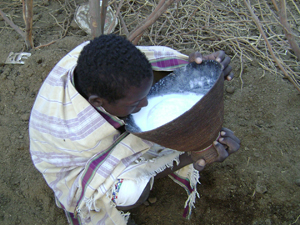About the project
Tuberculosis transmission in the pastoral communities is complex. It is transmitted between humans and domestic animals and between domestic animals and wild game. However, the relative contribution of the different species/strains of mycobacteria to the current TB epidemic is poorly known. In addition, little is known about the immunological, genetic, and socio-economic factors that lead to protection or susceptibility to infection or development of disease.
Objectives
The objectives of this project are to determine the prevalence of infection and disease in humans and animals; to isolate and characterize species/strains of mycobacteria that infect man and his domestic animals; and to determine immunological, genetic, environmental, and socio-economic factors that lead to infection or development of disease in the pastoral communities of Ethiopia.
One central theme of the project is to train Aklilu Lemma Institute of Pathobiology (ALIPB) staff at Ph.D. and M.Sc. levels to raise the competence of ALIPB in terms of manpower and infrastructure in the fields of molecular biology and immunology. Manpower training and acquisition of research facilities through this project are expected to promote the Ph.D. and M.Sc. programs currently run by ALIPB.
Outcomes
Subprojects
Ph.D. projects:
- Epidemiology and immunology of tuberculosis among pastoralists of Afar Regional State of Ethiopia, with special emphasis on factors underlying infection and development of disease, by Mengistu Legesse Dadi
- Molecular epidemiology of tuberculosis in livestock in Afar Regional State of Ethiopia, with special emphasis on genetic characterization of species/strains of mycobacteria that circulate in the Region, by Gezahegne Mamo Kassa.
M.Sc. projects:
- Socio-cultural attributes in the management and control of tuberculosis among Somali pastoralist communities in Somali Regional State of Ethiopia, by Abdi Ali Gele
- Diagnostic delay and potential of two fusion antigens for the diagnosis of tuberculosis in northeast Ethiopia, by Mulugeta Belay Mengesha
- Prevalence and associated factors of pulmonary tuberculosis among inmates: an active screening study in prisons of eastern Ethiopia, by Dawit Shawel Abebe
Financing
Norwegian Programme for Development, Research and Education NUFUPRO: 2007/10198
Project title: Studies of molecular and clinical epidemiology, and immunology of tuberculosis in pastoral communities and their livestock in Ethiopia
Cooperation
The project is a new bilateral collaboration between Addis Ababa University, Aklilu Lemma Institute of Pathobiology (ALIPB) and the University of Oslo, Institute for Health and Society (HELSAM), Department of Community Medicine.
In connection with the project, a new initiative has been established between Norwegian School of Veterinary Medicine/Norwegian Veterinary Institute, and University of Oslo, Department of Community Medicine to jointly coordinate NUFU projects and further promote collaboration between these institutions and East African countries (Ethiopia, Tanzania, Uganda, and Zambia) on bovine tuberculosis.
Start - Finish
2007 - 2014
 A boy drinking raw milk, Photo: Gezahegne Mamo Kassa
A boy drinking raw milk, Photo: Gezahegne Mamo Kassa
